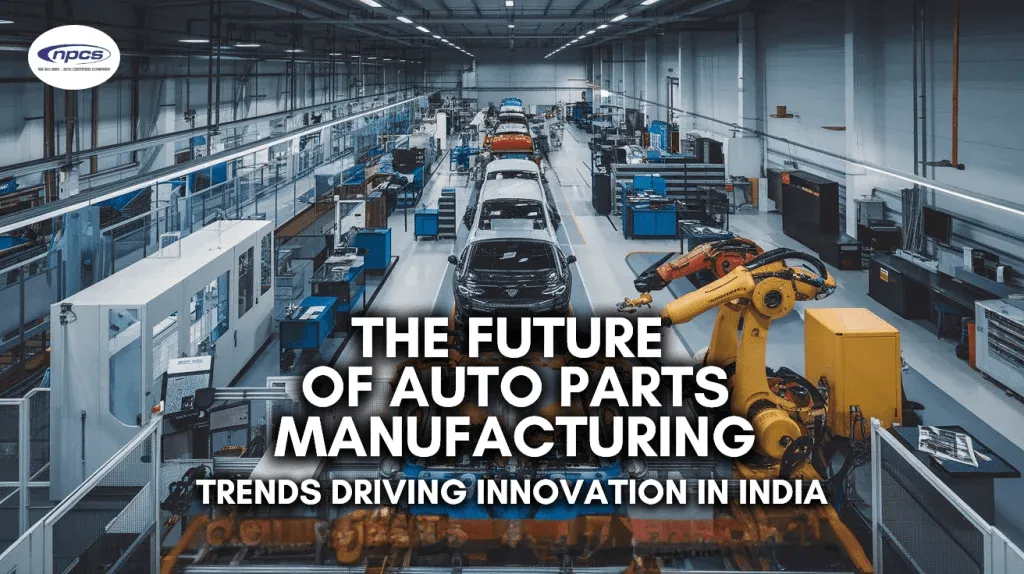An Emerging Revolution in the Indian Automotive Industry: Modern Manufacturing Practices and Technologies Impacting Every Aspect of Motor Vehicle Production. To supply the ever-increasing demand for motor vehicles, more innovative auto parts and accessories are needed. Today, manufacturers develop many advanced components to cater to consumer wants and industry requirements for the making of motor vehicles. Indeed, it is an exciting time in the sector.
As in this blog, we will walk you through the latest trends that create a wind of change in the manufacturing of auto parts and accessories in India.Â
Contents
- 0.1 1. Adoption of Automation and Industry 4.0 in Auto Parts Manufacturing
- 0.2 2. Electric Vehicles (EVs) and Their Impact on Auto Parts Manufacturing
- 0.3 3. Emphasis on Sustainability and Green Manufacturing Practices
- 0.4 4. The Role of 3D Printing in Auto Parts Manufacturing
- 0.5 5. Digitalization and the Use of Big Data in the Automotive Industry
- 0.6 Conclusion
- 1 Frequently Asked Question
1. Adoption of Automation and Industry 4.0 in Auto Parts Manufacturing
Undeniably, one of the most pronounced trends in today’s automotive industry is that of increasing automated processes and turning towards Industry 4.0. Using smart technologies such as artificial intelligence (AI), machine learning (ML), and Internet of Things (IoT) for efficient manufacturing processes is termed Industry 4.0 in the automotive industry. The provision of automation for manufacture of all kinds of parts and accessories for automobiles works wonders in improving precision during the production process and really speeds up the production process, apart from causing overall reduction in production costs.
An examination of the McKinsey & Company report states that Industry 4.0 when adopted by the automotive industry would lead to an increase in productivity by 25-30% and a decrease in costs by 10-15%. Automation offers manufacturers a minimum range of processes to make high-quality auto parts and accessories, thereby making auto parts more efficient and much safer to use.
Read Our Project ReportsÂ
- Auto Brake Pad and Auto Brake Shoe Production Business
- PLASTIC INJECTION MOULDING PLANT FOR AUTO PARTS – Manufacturing Plant, Detailed Project Report, Profile, Business Plan, Industry Trends, Market Research, Survey, Manufacturing Process, Machinery, Raw Materials, Feasibility Study, Investment Opportunities
- Helmet Manufacturing
How Automation is Shaping the Future of Manufacturing in India
India’s automotive industry is swiftly going to accept automation technologies for winning the competition at global levels. The major players in the game- Tata Motors, Mahindra, and Maruti Suzuki- have incorporated robotics, AI, and IoT in their manufacturing units. This differentiation that demanded these technologies guarantees that product quality would be better, delivery much faster, and manufacture at a much lesser cost.
An innovation in the way automotive parts and accessories are created is the contribution of automation to transformations. These would prove to be much more strength resistant along with newer designs and technologies.
Read Our BooksÂ
- Handbook on Automobile & Allied Products (2nd Revised Edition)#Â
- The Complete Book on Production of Automobile Components & Allied Products ( Best Seller )
- Handbook on Electric Vehicles Manufacturing
2. Electric Vehicles (EVs) and Their Impact on Auto Parts Manufacturing
The new era of EV has really changed the automotive scenescape in India. The demands for auto components and accessories specific to EVs are steadily rising as more consumers turn to eco-friendly transport. All forms of development, such as electric drivetrains, lithium-ion batteries, charging systems, and regenerative braking systems, are now being developed by manufacturers for their vehicles.
The government campaigns, such as FAME, are making EVs the most promising segment of the Indian automotive sector. The program that the Indian government is undertaking on electric mobility will speed up advancements in innovation in auto parts manufacture and attract more investment in R&D by companies for this developing market.
Auto Parts and Accessories Related to Electric Vehicle
As electric vehicles grow to be a household word, manufactures are revealing their plans for developing new auto parts and accessories that will be adjoined with pure electric vehicle applications. This would include items such as performance batteries, electric drivetrains, and lightweight materials. According to the report of NITI Aayog, by 2030, the electric vehicle market in India will be nearly 10 million units. Such exponential demand will definitely cast a net for more and more innovations in auto parts and accessories.
3. Emphasis on Sustainability and Green Manufacturing Practices
Automotive sustainability has been on a worldwide spree to conquer the world. India, too, is moving with the motion. As awareness about the environment and stricter government policies on carbon emissions are creating a buzz among manufacturers, thus they return to repair internal manufacturing processes that are greener in terms of sustainable materials, energy-efficient production techniques, and eco-friendly packaging at the shop floor level.
The global automotive sector is trying to cut down its carbon footprints by as much as 30% by the year 2025 with India active in this transformation. There are several initiatives toward becoming environment-friendly along these lines, like integrating renewable energy in manufacturing units, waste reduction, and funding into green production technologies.
Also Read:Â
Sustainable Materials for Auto Parts Manufacturing
There is a growing trend in the auto industry to move increasingly to sustainable materials-such as recycled plastics, bioplastics, and natural fibers. Close on this, Indian manufacturers are gearing up to improve producing auto parts and accessories from recycled and eco-friendly sources. For instance, Mahindra & Mahindra appraised itself of using recycled plastics in car interiors, whereas Tata Motors explored the usage of bio-based materials during vehicle production.
This is the foundation of a sustainable way forward, and in turn, it will also widen the horizon of competition for the manufacturers above all, as they will be appealing to customers’ need for an increasingly higher demand for eco-friendly products.
4. The Role of 3D Printing in Auto Parts Manufacturing
3D printing, better known as additive manufacturing, is another exciting development in the automobile industry. Companies use this technique to manufacture complex vehicle parts or accessories with very high precision and near zero wastage. Each new layer is added on the previously produced layer, and thus highly customized components are produced, which tend to be lighter, stronger, and more cost-effective.
The use of 3D printing in India’s automotive industry has just begun, but its future potential is enormous. With the help of this technology, 3D printing can enable the quick creation of prototypes and subsequently implement new design iterations and the production of specialty auto parts and accessories for niche markets.
Advantages of 3D Printing in the Automotive Industry
Enhancing production efficiencies for low volume parts; even prototyping is done faster and design iterations move much faster. Complex geometries, which otherwise would be very difficult or impossible with standard methods to produce, can be produced. Reduction in the waste of materials and energy.Â
These are some of the above elements for which 3D printing can be scarcely a hopeful foray into the future of auto parts and accessories manufacturing in India.
Also Read:Â
- How to Start Automobile & Mechanical Industry
- Automative Lubricants-Growth in India, Pattern and Forecast
5. Digitalization and the Use of Big Data in the Automotive Industry
As the automotive industry becomes more connected, there is a growing emergence of big data and digital tools. The manufacturers now predict consumer demand, optimization of production schedules, and improvements in supply chain management using big data. With the help of digital technologies, Indian industries can create more efficient and agile manufacturing processes.
Moreover, data analytics is being used by manufacturers for innovative new auto parts and accessories by giving them insight into consumer preference trends. Data-driven decisions help an organization design products from the onset according to the target audience.
Conclusion
 Several trends are, indeed, driving innovation across the sector. Be it the automation, Industry 4.0, the emergence of electric vehicles or sustainable manufacturing practices; Indian manufacturers are implementing the latest technologies in increasing competition within the segment. Surely, the revolutionizing environment of the automotive industry will keep increasing the demand for the independent innovative auto parts and accessories, opening new doors for many businesses in this sector.
For more insights on the automobile industry and its innovations, please visit Niir.org and find out all details of auto parts manufacturing and other trends in the industry.
Frequently Asked Question
What are the key trends shaping the future of auto parts manufacturing in India?
Major trends include automation and robotics, digital twin and Industry 4.0 technologies, electric vehicle (EV) part production, advanced materials, and sustainable manufacturing practices.
How is automation impacting auto parts manufacturing?
Automation boosts production efficiency, improves precision, reduces human error, and lowers long-term operating costs by integrating robotics and smart systems on the factory floor.
Why is electrification important for auto parts manufacturers?
With the rise of electric vehicles in India and globally, manufacturers are shifting toward EV-specific components like battery packs, electric motors, and power electronics, creating new market opportunities.
What role do smart technologies play in innovation?
Technologies such as IoT, AI, and digital twins enable real-time monitoring, predictive maintenance, optimized workflows, and better quality control throughout the production lifecycle.















